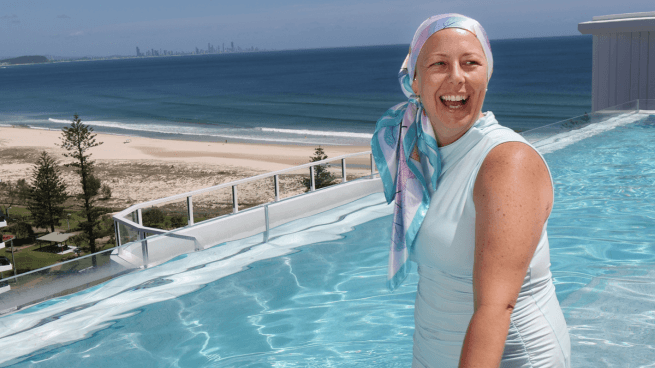Danelle’s Story

Ovarian cancer claims the lives of around 1,000 Australian women each year and is the deadliest gynaecological cancer, with a five-year survival rate of 49%.*
Currently, there is no available screening test for ovarian cancer. Most cases are advanced and have already spread beyond the ovaries when they are detected, narrowing treatment options.
Danelle never imagined that she would be fighting for her life against ovarian cancer at the age of 41 and was unaware that her family’s extensive history of breast cancer meant that the odds of her one day suffering ovarian cancer were dangerously high. Women who have the breast cancer (BRCA) 1 and 2 mutations have a 45-85% chance of developing breast cancer, as well as a 10-46% chance of developing ovarian cancer.
“I have always been aware of breast cancer and checked myself regularly and had mammograms, but ovarian cancer never crossed my mind,” Danelle said.
After suffering irregular menstrual cycles, Danelle visited her GP. Whilst her initial blood test and pap smear came back clear, she requested further investigation and was referred to Mater Hospital Brisbane. Danelle was diagnosed with stage 3 ovarian cancer, which had already spread to her spleen and diaphragm.
In November 2024, Danelle bravely underwent a full hysterectomy and removal of her ovaries, spleen and appendix, and is currently undergoing chemotherapy treatment at the Mater Cancer Care Centre.

Danelle continues to fight this aggressive cancer.
Mater Research Senior Research Fellow, Professor John Hooper is on a mission to change the game when it comes to earlier ovarian cancer diagnosis, and improved treatment options for patients.
Professor Hooper and his team have recently launched a clinical trial at Mater, which has been the culmination of 24 years of research. The trial assesses the safety of a new radio-tracer for ovarian cancer which could pinpoint cancer cells and make detection of the disease easier during radiology scans.
Up to 30 ovarian cancer patients are participating in the trial of this new tracing agent. If the Phase 1 clinical trial is successful, Professor Hooper believes most ovarian cancer patients could benefit.
“Generous support means we’re already working towards a second patient trial in the coming years in which this agent will be used to seek and kill cancerous cells with highly-targeted radiotherapy,” says Professor Hooper.
When you purchase a Mater Prize Home ticket, you’re helping to fund ovarian cancer research at Mater. Your support helps change the future of ovarian cancer diagnoses and treatment for people like Danelle. Thank you.

*AIHW Cancer Data in Australia 2023

We would love to hear from you
We would love to know what you think about Mater Lotteries!
1800 067 066
All times displayed in your local timezone unless stated otherwise. Mater Foundation Ltd as trustee for Mater Foundation is registered as a charity with the Australian Charities and Not-for-profits Commission. ABN 96723184640. All prices are displayed in AUD.



